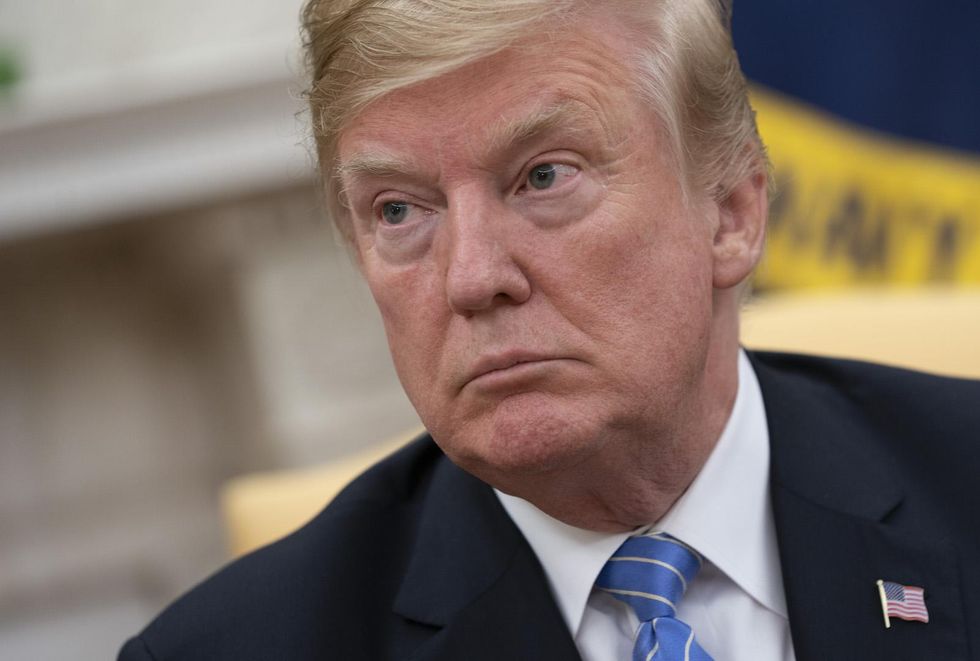
Image source: Chris Kleponis / Abaca

In anticipation of Supreme Court Justice Anthony Kennedy's imminent retirement, Democratic activists are demanding that their party's senators pull out all the stops to vote down President Donald Trump's eventual nominee, especially if there is any chance that said nominee might vote to overturn Roe v. Wade.
The thinking goes that by doing so, they can force Trump to return to the table with a more moderate nominee who will probably not overturn Roe, as they did with President Ronald Reagan after torpedoing Judge Robert Bork's nomination.
If this is their hope, they have badly misread both President Trump and the current electoral landscape.
Let's review the bidding. Republicans currently control 51 seats in the Senate, which would ordinarily mean that Democrats have a pretty good chance at retaking the Senate during the midterms, when the president's party usually loses some seats in Congress.
However, the 2018 electoral map is tilted against them to a nearly insane degree; of the Republican-held seats up for grabs in November, only Arizona and Nevada present even-toss odds for a Democratic pickup. Additionally, Phil Bredesen has a puncher's chance in Tennessee, and Democrats have deluded themselves that Beto O'Rourke has a Hail Mary's chance in Texas.
Other than that, the cupboard is totally and completely bare of potential Democratic pickups.
Meanwhile, Democrats are defending seats in two states (West Virginia and North Dakota) that President Donald Trump won in 2016 by over 30 points, and another two (Montana and Indiana) in states he won by almost 20 points. They are also defending three additional seats in toss-up races in Missouri, and Florida, and a number of other seats that are slightly more comfortable but by no means safe in Pennsylvania, Ohio, Minnesota, and Wisconsin.
Suppose that Trump nominates a candidate who is well qualified but too conservative for the liberal base of the Democratic Party to stomach. Assuming that Sen. John McCain (R-Ariz.) is unable to vote, and assuming that all Republicans other than possibly Lisa Murkowski (Alaska) and Susan Collins (Maine) are "yes" votes, Democrats would have to hold serve, and at least three of the four most endangered Democrats (Joe Manchin, Heidi Heitkamp, Joe Donnelly, and Jon Tester) would have to cast "no" votes.
In such a scenario, it beggars the imagination that Donald Trump would meekly fold and submit a centrist nominee. Presumably, the amount of time required for the nomination and hearings will take most of July and August, so if his nominee is rejected by the Senate, the obvious play would be to leave the seat open and try again after the midterm elections. After all, Trump has seen the way that an open SCOTUS seat can motivate his base to turn out and vote.
If that happens, Bredesen and O'Rourke can kiss their underdog bids goodbye. Bredesen benefits from the fact that he was a popular and competent governor who mostly stayed out of bitter cultural issues, and many Tennesseans might cast votes for him as a reward for a successful governorship, much like West Virginians did for Manchin. But if an open Supreme Court seat is on the table, there is no chance that likely GOP nominee Marsha Blackburn does not ride that horse to an easy victory in November. Ditto Ted Cruz in Texas.
Meanwhile, if either Manchin or Heitkamp plans to vote "no" and then face the voters of their states less than three months later, they might as well begin making their retirement plans now. Donnelly might potentially survive such a challenge, but he would immediately become an underdog. Tester would be in a slightly better position than the other three, but he would certainly face difficult sledding at home.
In other words, Democrats will have put an absolute cap on their possible gains at two seats, while almost certainly forfeiting at least three. And by the time the next Congress is sworn in, God willing either McCain's health will have improved to the point that he can cast a vote. Or, if the worst happens, Arizona Republican Gov. Doug Ducey — a Trump supporter — will have almost certainly appointed a "yes" vote senator to fill out the rest of McCain's term.
There is no realistic way the Democrats will have more potential "no" votes for a Trump SCOTUS nominee next January than they will have today. If the nominee is quickly confirmed, then Heitkamp, Manchin, Donnelly, and Tester breathe much easier. Bredesen and O'Rourke can continue their campaigns with at least some hope of victory.
But if voters head to the polls this November with a SCOTUS seat open, then the enthusiasm gap that the Democrats enjoy will immediately vanish. And in several key states that the Democrats absolutely have to win, they will have shot themselves in the foot and ensured a more Republican Senate in 2019 than the one that currently exists. And in that scenario, Trump can either send back the same nominee, or one who is even more conservative, and the court will end up shifting anyway.
Elections have consequences. One consequence of losing both the White House and the Senate — as the Democrats have done — is that the composition of the Supreme Court is likely to change in a way that Democrats won't like.
That change is inevitable; the only question is whether Democrats want to lose some Senate seats in a futile bid to stop it.
Leon Wolf
Former Managing Editor, News